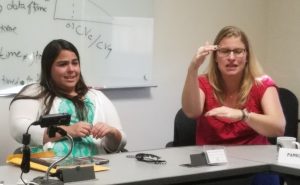
Synthesis working groups rely heavily on in-person collaboration. Free-flowing debate on goals and methods carries over from afternoon workshops through shared dinners. There’s little substitute for the immediacy of cooking up an analytical approach, scripting it onsite, discussing results, and making revisions — all within a few hours. And the easy availability of technical, analytical and logistical support just down the hallway eases the inevitable friction of collaboration.
But LTER working groups have not been able to meet in-person for nearly 2 years! So we are especially excited to announce the addition this Spring of two new postdoctoral associates and two new data analysts joining the LTER Network Office team to boost the synthesis effort.
 Ingrid Slette joined the Network Office as an LTER postdoc at the beginning of January 2022. Coming out of the Knapp lab with a strong interest in drought dynamics, Slette is already engaging with the Drought Effects synthesis group and exploring connections with other synthesis groups.
Ingrid Slette joined the Network Office as an LTER postdoc at the beginning of January 2022. Coming out of the Knapp lab with a strong interest in drought dynamics, Slette is already engaging with the Drought Effects synthesis group and exploring connections with other synthesis groups.
 Joan Dudney brought deep experience with the Synchrony synthesis group to her UCSB postdoctoral fellowship and is excited to engage with the current crop of synthesis working groups. Dudney recently completed a Smith Postdoctoral Fellowship at UC Davis and received her PhD from the Battles Lab in the Department of Environmental Science, Policy and Management at UC Berkeley.
Joan Dudney brought deep experience with the Synchrony synthesis group to her UCSB postdoctoral fellowship and is excited to engage with the current crop of synthesis working groups. Dudney recently completed a Smith Postdoctoral Fellowship at UC Davis and received her PhD from the Battles Lab in the Department of Environmental Science, Policy and Management at UC Berkeley.
 Nicholas Lyon joins the Network Office as a data analyst, building on tools he learned analyzing the data for his Master’s degree in Ecology and Evolutionary Biology at Iowa State University and continued to master while working with the Herbivory Variability Network and as an entomology consultant.
Nicholas Lyon joins the Network Office as a data analyst, building on tools he learned analyzing the data for his Master’s degree in Ecology and Evolutionary Biology at Iowa State University and continued to master while working with the Herbivory Variability Network and as an entomology consultant.
 In February, Angel Chen will join the Network Office as a data analyst. Angel has a Bachelor’s degree in statistics and data science from UC Santa Barbara and recently completed an internship with the Arctic Data Center.
In February, Angel Chen will join the Network Office as a data analyst. Angel has a Bachelor’s degree in statistics and data science from UC Santa Barbara and recently completed an internship with the Arctic Data Center.
Data analysts and postdocs will be supporting synthesis groups to make more rapid progress on challenging analytical tasks, aiding in the curation and archiving of derived datasets, and helping groups to script their analyses in a way that is documented and repeatable. After all, it’s LTER data — it keeps coming in year after year!
View all current and prior LTER synthesis activities on the LTER Network website. LTER synthesis groups often use LTER data together with other existing data sources. The next call for LTER synthesis proposals is due out in late Spring 2022 and will be due in early October 2022.










